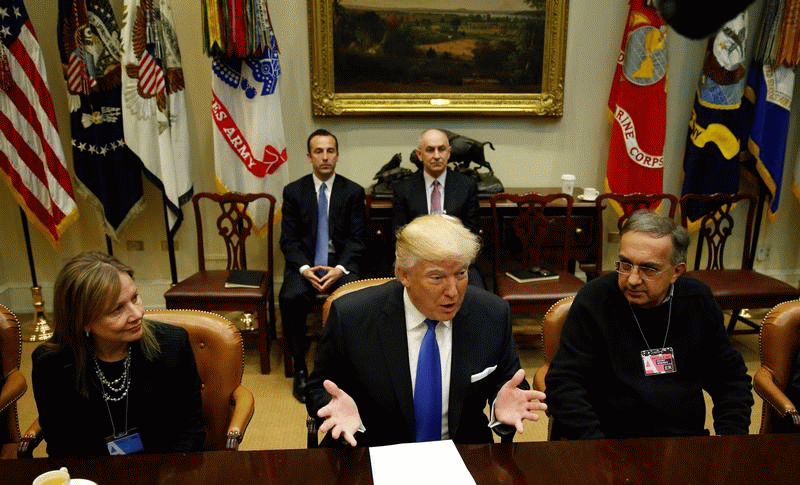With US President Donald Trump recently promising to wipe out at least 75 percent of government regulations that hinder US businesses and slap a “substantial border tax” on US companies that move production out of the country, concern in Canada about the effects of a Trump presidency on his country’s largest trading partner was just ratcheted up.
Canada sends 75 percent of its exports to its neighbour to the south.
In his first workday in the Oval Office, Trump also signed an executive order formally withdrawing the US from the Trans-Pacific Partnership trade deal, and was expected to make good on his promise to rip up, or at least renegotiate, the 23-year-old North American Free Trade Agreement between Canada, the United States and Mexico. He has reportedly already set up meetings with Prime Minister Justin Trudeau and Mexican President Enrique Peña Nieto to discuss a new deal.
John Boscariol, head of the international trade and investment law group at McCarthy Tétrault LLP in Toronto, notes that Canada has indicated it is willing to revisit NAFTA, which he called an “old” trade deal, particularly in light of its deal signed with the European Union in October, “which is far more liberalizing in many aspects.”
While acknowledging there is “a lot of concern” in the Canadian business community about a new wave of US protectionism, Boscariol –– like many others –– believes any changes will be aimed at stemming the flow of US jobs to much cheaper jurisdictions.
“If you look at not just what Trump has said but the concerns underlying what he’s said, it really involves Mexico and China more than Canada. I know some of the recent comments have suggested that Canada could get sideswiped in that –– but I think there’s a possibility that Canada could be in a better position than perhaps any other trading partner when the dust settles.”
Boscariol says that with Trump now installed in office he’ll be fully briefed by his cabinet and advisors on Canada, including on the intricate network of integrated cross-border supply chains. Take auto production, for example. Trump met with the heads of GM, Ford and Fiat Chrysler on January 24 and urged them to build more of their cars in the US to create more jobs. But Boscariol says car manufacturing in Canada and the US is so integrated that “cars cross the border dozens of times when being manufactured when you look at parts, components and assemblies.”
If Trump is looking at putting on a border tax to repatriate jobs, “I think they’re going to realize that encouraging anyone to move auto production from Canada to the United States would further harm US jobs” because it will lead to higher costs, says Boscariol.
Canada is in a better position than cheaper offshore manufacturing destinations, he adds, but also jurisdictions such as the European Union, which have no free-trade deal with the US. “It may be, if we come out of this relatively unscathed, Canada could be a real hub for accessing the US market. More so than before.
“If Trump takes a strong protectionist turn relative to other countries [outside Canada], we’ve got the free-trade agreement with the EU, we’re negotiating free-trade agreements with Asian countries and others, so we’re going to look like a pretty attractive destination [for investment and manufacturing] if we have free-trade access to the US market.”
Oil patch expectations
A more cautious note is struck by the energy patch, even though Trump has now approved the Keystone XL pipeline project that former President Barack Obama rejected.
Canada does not currently have a pipeline to move its landlocked Alberta crude to a seaport, leaving the US as its sole export market. The Keystone XL pipeline — whose construction is still subject to renegotiation of the original agreement between TransCanada Corp. and the Trump administration — would send Canadian crude to the Gulf of Mexico, to be refined in Texas and then shipped to China and other energy-hungry Asian countries.
Trump has made it clear that he expects a better deal from Canada for the pipeline, and has now indicated that he wants the materials used to construct the Keystone XL pipeline to come from the US, for starters. But regardless of what he asks for in the deal, Canada’s energy sector is in a weak position to argue against US demands.
”We don’t have anywhere to ship our crude beyond the US,” says Brian Bidyk, an energy practitioner at DLA Piper (Canada) LLP in Calgary, particularly on the heels of Trudeau’s rejection of the Enbridge Northern Gateway pipeline — which would have carried Alberta crude to the coast of British Columbia — in November.
Concern has also been stoked by Trump’s America First Energy Plan, which contemplates US energy independence by taking “advantage of the estimated $50 trillion in untapped shale, oil, and natural gas reserves” in the United States, according to the White House website.
Bidyk says an energy-independent US with enough crude oil to support its own needs could turn the US from a customer into a competitor. That’s bad news. Even if Canadian crude gets to port through Keystone XL, crude from Alberta’s oil sands is more expensive to produce and handle than American crude because of its higher flammability.
Then, of course, there’s the environment; on its America First Energy Plan webpage the Trump administration describes getting rid of “burdensome regulations on our energy industry,” including “harmful and unnecessary policies such as the Climate Action Plan and the Waters of the US rule.”
If the US withdraws from international environmental commitments but Canadian energy producers are charged for their carbon emissions, Canadian crude oil would become comparatively more expensive still, negatively affecting the oil patch and Canada’s petro-dollar.
Environmentalists wary
Rick Williams, national leader of the environmental law group at Borden Ladner Gervais LLP in Vancouver, says he is braced for “a dramatic shift” under a Trump presidency.
For the past eight years, and especially since the Liberal government came to power, Canada and the US have essentially been marching in the same direction when it comes to climate action. “Now, virtually overnight, we’ll see the US and Canada moving in opposite directions where we’re no longer aligned with our largest trading partner.” Where Obama and Trudeau were working towards a North American climate plan, “with Trump it’s all but dead.”
Trump has tweeted in the past that he believes “global warming was created by and for the Chinese in order to make U.S. manufacturing non-competitive.” In May, he said his administration would “cancel participation in the Paris climate agreement,” although he also says he has an “open mind to it.”
Williams believes “it’s a virtual certainty we’re not going to see any US any national carbon-pricing policy for the next four to eight years.”
But Williams advises against giving up all hope, because while it appears the old US federal climate plan is going to die, much American climate policy has been driven at the state level to date. One example is the Western Climate Initiative, which was spearheaded by western American states in 2007 to develop a regional target for reducing greenhouse gas emissions. “There’s no certainty that kind of thing won’t continue under a Trump presidency,” he says.
Another development that could end up working to Canada’s advantage is Trump’s indication he is going to go his own way on using economic sanctions.
In Iran, for example –– where Canada has been repealing its sanctions and Trump is threating to increase them –– the dynamic could create an emerging market for Canadian companies.
“A lot of oil-field services companies, I know they’ve been looking at Iran,” says Boscariol of McCarthy Tétrault. Ditto for Cuba, where, he says, “it looks like Trump is going to reverse Obama’s policy of opening up trade with Cuba. This has real impact for Canadian businesses doing business beyond the United States.”
Make Canada more welcoming
Brian Facey, chair of the competition, antitrust and foreign Investment group at Blake Cassels & Graydon LLP in Toronto, has some general advice: Watch what the new president does over time as opposed to focusing on what he says, because things may not turn out as badly as you think.
“The people advising President Trump are from Goldman Sachs and from other major interests, so they’re sophisticated people. They’re not going to do knee-jerk things. … Big is not bad anymore.”
Facey suspects Trump’s “America first” policy could actually have a positive effect on Canada, bringing new investors through the door.
“If the US becomes more inward-facing and insular, I think Canada has to become a lot more welcoming. We’re going to have to spend more time on accessing that kind of investment from countries that have traditionally had difficulties investing in Canada, like China,” he says.
“So while Canada’s going to want to keep close to the US and strike the best deals they can, in terms of doing reviews I suspect the Canadian government is going to be very open to foreign investment.”
Perhaps the last word should go to Stephen Schwarzman, Blackstone Group LP’s CEO and a senior Trump advisory as head of the president’s strategic and policy forum.
“Canada is held in very high regard” by the US, Schwarzman told reporters in Calgary on January 23, after meeting with Trudeau during a three-day cabinet retreat. “We have balanced trade between the US and Canada,” he said, adding that any changes to existing agreements would be “very low in terms of collateral damage” to Canada.





